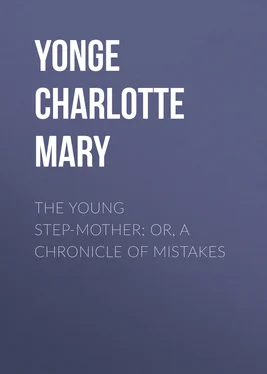Charlotte Yonge - The Young Step-Mother; Or, A Chronicle of Mistakes
Здесь есть возможность читать онлайн «Charlotte Yonge - The Young Step-Mother; Or, A Chronicle of Mistakes» — ознакомительный отрывок электронной книги совершенно бесплатно, а после прочтения отрывка купить полную версию. В некоторых случаях можно слушать аудио, скачать через торрент в формате fb2 и присутствует краткое содержание. Жанр: foreign_prose, literature_19, Европейская старинная литература, foreign_antique, на английском языке. Описание произведения, (предисловие) а так же отзывы посетителей доступны на портале библиотеки ЛибКат.
- Название:The Young Step-Mother; Or, A Chronicle of Mistakes
- Автор:
- Жанр:
- Год:неизвестен
- ISBN:нет данных
- Рейтинг книги:4 / 5. Голосов: 1
-
Избранное:Добавить в избранное
- Отзывы:
-
Ваша оценка:
- 80
- 1
- 2
- 3
- 4
- 5
The Young Step-Mother; Or, A Chronicle of Mistakes: краткое содержание, описание и аннотация
Предлагаем к чтению аннотацию, описание, краткое содержание или предисловие (зависит от того, что написал сам автор книги «The Young Step-Mother; Or, A Chronicle of Mistakes»). Если вы не нашли необходимую информацию о книге — напишите в комментариях, мы постараемся отыскать её.
The Young Step-Mother; Or, A Chronicle of Mistakes — читать онлайн ознакомительный отрывок
Ниже представлен текст книги, разбитый по страницам. Система сохранения места последней прочитанной страницы, позволяет с удобством читать онлайн бесплатно книгу «The Young Step-Mother; Or, A Chronicle of Mistakes», без необходимости каждый раз заново искать на чём Вы остановились. Поставьте закладку, и сможете в любой момент перейти на страницу, на которой закончили чтение.
Интервал:
Закладка:
‘This is unbearable,’ cried Albinia. ‘I shall give notice that I am always engaged in the morning.’
She desired each young lady to work a sum in her absence, and left them to murmur, if they were so disposed. Perhaps it was Lucy’s speech that made her inflict the employment; at any rate, her spirit was not as serene as she could have desired.
Mr. Kendal was quite willing that she should henceforth shut her door against company in the morning; that is to say, he bowed his head assentingly. She was begging him to take a walk with her, when, at another sound of the bell, he made a precipitate retreat into his study. The visitors were the Belmarche family. The old lady was dark and withered, small, yet in look and air, with a certain nobility and grandeur that carried Albinia back in a moment to the days of hoops and trains, of powder and high-heeled shoes, and made her feel that the sweeping courtesy had come straight from the days of Marie Antoinette, and that it was an honour and distinction conferred by a superior—superior, indeed, in all the dignity of age, suffering, and constancy.
Albinia blushed, and took her hand with respect very unlike the patronizing airs of Bayford Bridge towards ‘poor old Madame Belmarche,’ and with downcast eyes, and pretty embarrassment, heard the stately compliments of the ancien regime.
Miss Belmarche was not such a fine specimen of Sevres porcelain as her mother. She was a brown, dried, small woman, having lost, or never possessed, her country’s taste in dress, and with a rusty bonnet over the tight, frizzly curls of her front, too thin and too scantily robed to have any waist, and speaking English too well for the piquant grace of her mother’s speech. Poor lady! born an exile, she had toiled, and struggled for a whole lifetime to support her mother; but though care had worn her down, there was still vivacity in her quick little black eyes, and though her teeth were of a dreadful colour, her laugh was so full of life and sweetness, that Albinia felt drawn towards her in a moment.
Silent and demure, plainly dressed in an old dark merino, and a white-ribboned faded bonnet, sat a little figure almost behind her grandmother. Her face had the French want of complexion, but the eyes were of the deepest, most lustrous hue of grey, almost as dark as the pupils, and with the softness of long dark eyelashes—beautiful eyes, full of light and expression—and as she moved towards the table, there was a finish and delicacy about the whole form and movements, that made her a most pleasing object.
But Albinia could not improve her acquaintance, for in flowed another party of visitors, and Madame curtsied herself out again, Albinia volunteering that she would soon come to see her, and being answered, ‘You will do me too much honour.’
Another afternoon devoured by visitors! Every one seemed to have come except the persons who would have been most welcome, Mr. Dusautoy, and Winifred’s friends, the Nugents.
When, at four o’clock, she had shaken hands with the last guest, she gave a hearty yawn, jumped up and shook herself, as she exclaimed, ‘There! There! that is done! I wonder whether your papa would come out now?’
‘He is in his study,’ said the girls.
Albinia thought of knocking and calling at the door, but somehow it seemed impossible, and she decided on promenading past his window to show that she was ready for him. But alas! those evergreens! She could not see in, and probably he could not see out.
‘Ha!’ cried Lucy, as they pursued their walk into the kitchen garden, ‘here are some asparagus coming up. Grandmamma always has our first asparagus.’
Albinia was delighted to find such an opening. Out came her knife—they would cut the heads and take them up at once; but when the tempting white-stalked, pink-tipped bundle had been made up and put into a basket, a difficulty arose.
‘I’ll call the boy to take it,’ said Lucy.
‘What, when we are going ourselves?’ said Albinia.
‘Oh! but we can’t.’
‘Why? Do you think we shall break down under the weight?’
‘O no, but people will stare.’
‘Why—what should they stare at?’
‘It looks so to carry a basket—’
Albinia burst into one of her merriest peals of laughing.
‘Not carry a basket! My dear, I have looked so all the days of my life. Bayford must endure the spectacle, so it may as well begin at once.’
‘But, dear mamma—’
‘I’m not asking you to carry it. O no, I only hope you don’t think it too ungenteel to walk with me. But the notion of calling a boy away from his work, to carry a couple of dozen asparagus when an able-bodied woman is going that way herself!’
Albinia was so tickled that she could hardly check herself, even when she saw Lucy looking distressed and hurt, and little laughs would break out every moment as she beheld the young lady keeping aloof, as if ashamed of her company, turning towards the steep church steps, willing at least to hide the dreadful sight from the High Street.
Just as they had entered the narrow alley, they heard a hasty tread, and almost running over them with his long strides, came Mr. Dusautoy. He brought himself up short, just in time, and exclaimed, ‘I beg your pardon—Mrs. Kendal, I believe. Could you be kind enough to give me a glass of brandy?’
Albinia gave a great start, as well she might.
‘I was going to fetch one,’ quickly proceeded Mr. Dusautoy, ‘but your house is nearer. A poor man—there—just come home—been on the tramp for work—quite exhausted—’ and he pointed to one of the cottages.
‘I’ll fetch it at once,’ cried Albinia.
‘Thank you,’ he said, as they crossed the street. ‘This poor fellow has had nothing all day, has walked from Hadminster—just got home, sank down quite worn out, and there is nothing in the house but dry bread. His wife wants something nearly as much as he does.’
In the excitement, Albinia utterly forgot all scruples about ‘Bluebeard’s closet.’ She hurried into the house, and made but one dash, standing before her astonished husband’s dreamy eyes, exclaiming, ‘Pray give me the key of the cellaret; there’s a poor man just come home, fainting with exhaustion, Mr. Dusautoy wants some brandy for him.’
Like a man but half awake, obeying an apparition, Mr. Kendal put his hand into his pocket and gave her the key. She was instantly opening the cellaret, seeking among the bottles, and asking questions all the time. She proposed taking a jug of the kitchen-tea then in operation, and Mr. Dusautoy caught at the idea, so that poor Lucy beheld the dreadful spectacle of the vicar bearing a can full of steaming tea, and Mrs. Kendal a small cup with the ‘spirituous liquor.’ What was the asparagus to this?
Albinia told her to go on to Mrs. Meadows’, and that she should soon follow. She intended to have gone the moment that she had carried in the cup, leaving Mr. Dusautoy in the cottage, but the poor trembling frightened wife needed woman’s sympathy and soothing, and she waited to comfort her, and to see the pair more able to enjoy the meeting, in their tidy, but bare and damp-looking cottage. She promised broth for the morrow, and took her leave, the vicar coming away at the same time.
‘Thank you,’ he said, warmly, as they came out, and turned to mount the hill together.
‘May I go and call on them again?’
‘It will be very kind in you. Poor Simkins is a steady, good sort of fellow, but a clumsy workman, down-hearted, and with poor health, and things have been untoward with him.’
‘People, who do not prosper in the world are not always the worst,’ said Albinia.
‘No, indeed, and these are grateful, warm-hearted people that you will like, if you can get over the poor woman’s lackadaisical manner. But you are used to all that,’ he added, smiling. ‘I see you know what poor folk are made of.’
Читать дальшеИнтервал:
Закладка:
Похожие книги на «The Young Step-Mother; Or, A Chronicle of Mistakes»
Представляем Вашему вниманию похожие книги на «The Young Step-Mother; Or, A Chronicle of Mistakes» списком для выбора. Мы отобрали схожую по названию и смыслу литературу в надежде предоставить читателям больше вариантов отыскать новые, интересные, ещё непрочитанные произведения.
Обсуждение, отзывы о книге «The Young Step-Mother; Or, A Chronicle of Mistakes» и просто собственные мнения читателей. Оставьте ваши комментарии, напишите, что Вы думаете о произведении, его смысле или главных героях. Укажите что конкретно понравилось, а что нет, и почему Вы так считаете.












